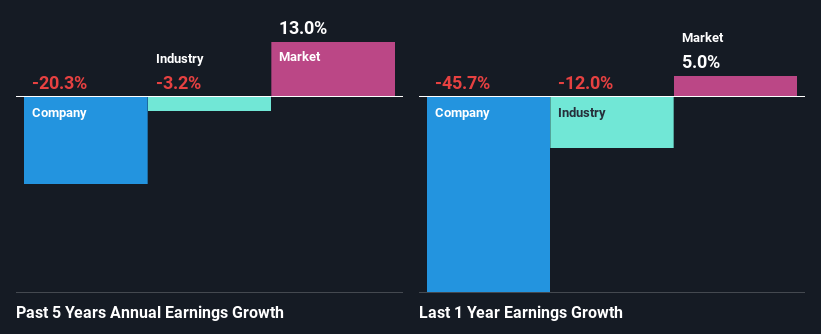- United Kingdom
- /
- Consumer Durables
- /
- LSE:BTRW
Barratt Redrow plc's (LON:BTRW) Has Been On A Rise But Financial Prospects Look Weak: Is The Stock Overpriced?
Barratt Redrow (LON:BTRW) has had a great run on the share market with its stock up by a significant 14% over the last month. However, we decided to pay close attention to its weak financials as we are doubtful that the current momentum will keep up, given the scenario. In this article, we decided to focus on Barratt Redrow's ROE.
Return on Equity or ROE is a test of how effectively a company is growing its value and managing investors’ money. Simply put, it is used to assess the profitability of a company in relation to its equity capital.
How Is ROE Calculated?
ROE can be calculated by using the formula:
Return on Equity = Net Profit (from continuing operations) ÷ Shareholders' Equity
So, based on the above formula, the ROE for Barratt Redrow is:
1.5% = UK£121m ÷ UK£7.9b (Based on the trailing twelve months to December 2024).
The 'return' is the profit over the last twelve months. That means that for every £1 worth of shareholders' equity, the company generated £0.02 in profit.
View our latest analysis for Barratt Redrow
What Has ROE Got To Do With Earnings Growth?
We have already established that ROE serves as an efficient profit-generating gauge for a company's future earnings. Based on how much of its profits the company chooses to reinvest or "retain", we are then able to evaluate a company's future ability to generate profits. Assuming everything else remains unchanged, the higher the ROE and profit retention, the higher the growth rate of a company compared to companies that don't necessarily bear these characteristics.
A Side By Side comparison of Barratt Redrow's Earnings Growth And 1.5% ROE
It is hard to argue that Barratt Redrow's ROE is much good in and of itself. Not just that, even compared to the industry average of 5.6%, the company's ROE is entirely unremarkable. Given the circumstances, the significant decline in net income by 20% seen by Barratt Redrow over the last five years is not surprising. We believe that there also might be other aspects that are negatively influencing the company's earnings prospects. Such as - low earnings retention or poor allocation of capital.
As a next step, we compared Barratt Redrow's performance with the industry and found thatBarratt Redrow's performance is depressing even when compared with the industry, which has shrunk its earnings at a rate of 3.2% in the same period, which is a slower than the company.

Earnings growth is an important metric to consider when valuing a stock. It’s important for an investor to know whether the market has priced in the company's expected earnings growth (or decline). By doing so, they will have an idea if the stock is headed into clear blue waters or if swampy waters await. One good indicator of expected earnings growth is the P/E ratio which determines the price the market is willing to pay for a stock based on its earnings prospects. So, you may want to check if Barratt Redrow is trading on a high P/E or a low P/E, relative to its industry.
Is Barratt Redrow Efficiently Re-investing Its Profits?
With a high three-year median payout ratio of 73% (implying that 27% of the profits are retained), most of Barratt Redrow's profits are being paid to shareholders, which explains the company's shrinking earnings. With only a little being reinvested into the business, earnings growth would obviously be low or non-existent. To know the 4 risks we have identified for Barratt Redrow visit our risks dashboard for free.
Moreover, Barratt Redrow has been paying dividends for at least ten years or more suggesting that management must have perceived that the shareholders prefer dividends over earnings growth. Our latest analyst data shows that the future payout ratio of the company is expected to drop to 54% over the next three years. As a result, the expected drop in Barratt Redrow's payout ratio explains the anticipated rise in the company's future ROE to 8.7%, over the same period.
Conclusion
On the whole, Barratt Redrow's performance is quite a big let-down. The company has seen a lack of earnings growth as a result of retaining very little profits and whatever little it does retain, is being reinvested at a very low rate of return. That being so, the latest industry analyst forecasts show that the analysts are expecting to see a huge improvement in the company's earnings growth rate. To know more about the latest analysts predictions for the company, check out this visualization of analyst forecasts for the company.
Valuation is complex, but we're here to simplify it.
Discover if Barratt Redrow might be undervalued or overvalued with our detailed analysis, featuring fair value estimates, potential risks, dividends, insider trades, and its financial condition.
Access Free AnalysisHave feedback on this article? Concerned about the content? Get in touch with us directly. Alternatively, email editorial-team (at) simplywallst.com.
This article by Simply Wall St is general in nature. We provide commentary based on historical data and analyst forecasts only using an unbiased methodology and our articles are not intended to be financial advice. It does not constitute a recommendation to buy or sell any stock, and does not take account of your objectives, or your financial situation. We aim to bring you long-term focused analysis driven by fundamental data. Note that our analysis may not factor in the latest price-sensitive company announcements or qualitative material. Simply Wall St has no position in any stocks mentioned.
About LSE:BTRW
Barratt Redrow
Engages in the housebuilding business in the United Kingdom.
Excellent balance sheet with reasonable growth potential.
Similar Companies
Market Insights
Community Narratives




